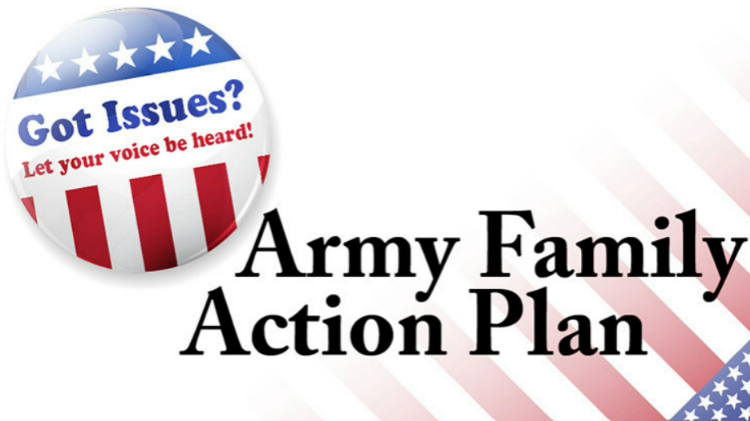- What is AFAP?
-
The AFAP (Army Family Action Plan) is a grassroots level process that identifies issues of concern for the GLOBAL Army. The AFAP is a program that gives everyone in the Army the opportunity to influence his/her own quality of life and standard of living. Installations and local levels hold AFAP forums. Active and Reserve soldiers, retirees, surviving spouses, DA civilians, Family members, and tenant organizations identify issues they believe are important to maintain a good standard of living.
Local commanders see to it that the issues are worked toward resolution. About 90% of AFAP issues are retained and worked at a local level, resulting in ongoing community improvements. Some issues are applicable beyond the local level. These are sent up to Installation Management Command (IMCOM) and Headquarters, Department of Army for further consideration. The issues that are selected for the AFAP are worked toward resolution by Army staff and DoD agencies.
A board of key DOD and Army staff general officer and senior executive service representatives lend the teeth to the AFAP process. This board, the AFAP General Officer Steering Committee (GOSC), reviews the progress of AFAP issues on a semi-annual basis. The AFAP GOSC is the final deciding authority on the status of all issues (determining if an issue is resolved, unattainable, or needs to remain active until the issue’s stated objectives have been met)
- How is AFAP Accomplished?
-
Fort Leavenworth will host an AFAP conference that brings together representatives of the TOTAL ARMY. These representatives, serving as conference delegates, evaluate issues that affect our quality of life at Fort Leavenworth and throughout the Army.
- What qualifies as an AFAP issue?
-
Issues that affect everyone at Fort Leavenworth or the Global Army are good AFAP issues. The focus should be on improving facilities, changing policy or regulation, and just making things work better for everyone. Issues may be on pay and allowance, readiness, retention and training, single Soldier issues, PCS moves, medical, dental, schools, childcare, AAFES, MWR activities, and volunteers.
- What are some examples of AFAP issues?
-
In the history of AFAP, 98 changes have been made into legislation, 141 policies or regulations have been revised, and 162 programs and services have been improved at the Department of Army level.
Programs and services have been improved at the Department of Army level. There have been legislative and regulatory changes to improve quality of life for the Army Family throughout the history of AFAP.
- TRICARE for Life
- Military Savings Plan
- AER provides grants in overseas locations to assist with financial aid for spouses to pursue undergrad, vo/tech, high school completion, and English as a Second Language studies
- Chiropractic Care for active duty
- DOD Reserve Component family member ID card
- A vehicle can be stored at government expense when a Soldier is reassigned to an area where shipment isn’t authorized
- Living Expense was authorized for first-term enlisted personnel and is being pursued for first-term officers
- Family Readiness Groups (FRG) were institutionalized
- Programs like Army Family Team Building (AFTB) and Better Opportunities for Single Soldiers (BOSS)
- Dislocation Allowance (DLA) for first PCS (All)
- Informational and interactive Web sites have been established to address retirement information and planning, employment opportunities and application, and enlisted soldier assignments
- Be A Delegate
-
As a delegate you not only represent your community, you represent the Army. Delegates are placed into work groups to discuss issues that are submitted to the conference. You prioritize the top three issues and then with the help of your facilitation team write the issue so that it can be presented to the Army leadership here at Fort Leavenworth at the report-out the last day of the conference.
To become a delegate, send an email to usarmy.leavenworth.imcom-fmwrc.mbx.leav-mwrhq@army.mil
Please include your name, phone number, email and preferred way to contact you.
The AFAP Conference will be on November 14, 2024, from 8:30AM - 3:30PM at the Frontier Conference Center (FCC).
Delegates must arrive at 8:30AM to check in, the event begins at 9AM.
ACS will be providing a FREE lunch for all delegates.
- Submit an AFAP Issue
-
We realize not everyone can be a delegate because of prior commitments, so the next best thing is to submit your issues. One person’s issue CAN make a difference.
Tell AFAP what your concerns are and what you think should be done to address those concerns.
To submit an issue, click HERE to be redirected to the Army Family Web Portal. Complete the form with as much detail as possible and click "submit".
Last day to submit issues for Fort Leavenworth is October 31st!
The Army Family Action Plan (AFAP) Issue Management System (IMS) allows registered and unregistered users to submit online issues. Issues are reviewed and managed by AFAP staff, and IMS can be used to track the status of your issue and view others that are currently under review.
- Volunteer To Work The Conference in November 14, 2024
-
The AFAP Conference is run by volunteers who care about the community and want to make life better not only here at Fort Leavenworth, but across the Army. All resume enhancing training is provided.
To become an AFAP volunteer send an email to usarmy.leavenworth.imcom-fmwrc.mbx.leav-mwrhq@army.mil. Please include your name, phone number, email and preferred way to contact you.
The AFAP Conference will be on November 14, 2024, from 8:30AM - 3:30PM at the FCC.
- Success Stories
-
Here are just a few of the enhancements that came from AFAP issues submitted by people like you:
Pay and Leave
- Soldier paternity leave
- Annual leave carryover increase from 60 to 75 days
- Military pay table changes, including targeted pay raises
- Military Thrift Savings Plan
Educational Benefits
- Post-9/11 Veterans Educational Assistance Act of 2008
- Distributed Soldier Montgomery GI Bill benefits to dependents
- Extended educational benefits for spouses
- In-state tuition for military dependents
Child Care
- Dedicated special needs space in Child, Youth, and School Services (CYSS)
- Audio/video surveillance in child care centers
- Minimum standards for Army child care
Medical
- Chiropractic treatment for Active Duty Soldiers
- Exceptional Family Member Program enrollment eligibility for Reserve Component Soldiers
- Dental and visual insurance coverage for federal employees
- Medical coverage for activated Reserve Component Families
Single Soldiers
- Funding for Better Opportunities for Single Soldiers (BOSS)
- Standardized barracks security measures
Spouse Employment
- Spouse professional weight allowance for PCS moves
- Family member employment in the Civil Service System
Changing the Army One Issue at a Time!
Last day to submit issues for Fort Leavenworth is October 31, 2024.




